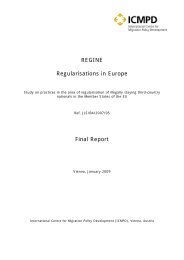taxud/2414/08 - European Commission - Europa
taxud/2414/08 - European Commission - Europa
taxud/2414/08 - European Commission - Europa
You also want an ePaper? Increase the reach of your titles
YUMPU automatically turns print PDFs into web optimized ePapers that Google loves.
(bb) Cross-border VAT grouping<br />
The introduction of VAT grouping provisions for cross-border supplies of services would<br />
have failed to achieve tax neutrality. Various techniques applied in the different Member<br />
States such as national VAT grouping, differences in VAT rates as well as differences in<br />
applying the rules for the right to deduct input VAT lead to cost advantages for economic<br />
operators in those Member States where they are applied. Introducing VAT grouping<br />
provisions for cross-border supplies of services would have lead to a situation where<br />
these advantages would have been rendered transferable between Member States with the<br />
consequence of violating the principle of tax neutrality and of causing competitive<br />
distortions In addition the administrative charges for practising cross-border grouping<br />
were considered inconsistent with the objective to reduce the administrative costs for<br />
business and fiscal authorities. Cross-border grouping would have introduced a general<br />
principle of exemption for a specific group of economic operators. Where such a general<br />
principle is introduced, the principle of equal treatment would have required admitting it<br />
also for other economic operators leading to a general rupture in the fundamental<br />
principles of VAT and unforeseeable budgetary risks for Member States.<br />
(cc) Limited and uniform threshold for input tax deductibility<br />
The introduction of a limited and uniform threshold for input tax deductibility as it is<br />
currently practised in some third countries such as Australia and New Zealand would<br />
have been inconsistent with the principle of tax neutrality, requiring that input VAT<br />
should only be deductible in as much as taxable output is generated. Granting this<br />
possibility to a specific group of operators would again have required admitting it also<br />
for other economic operators leading to a general rupture in the fundamental principles of<br />
VAT and unforeseeable budgetary risks for Member States. In addition the economic<br />
structures in Member States was much more heterogeneous than in New Zealand and in<br />
Australia; against this background a uniform threshold would have increased economic<br />
distortions between Member States.<br />
Against this background only two solutions which were consistent with the principle of<br />
tax neutrality and reduced the impact of non-deductible VAT on the costs of economic<br />
operators remained: Giving the economic operators concerned the option for taxation and<br />
co-operating on a cost-sharing basis which excludes the effect of input VAT in the costs.<br />
(dd) Option to tax for the economic operator<br />
The reasons for the <strong>Commission</strong> to propose an option to tax for the economic operators<br />
are numerous:<br />
- VAT is a consumption tax; in the case of exempt financial and insurance services<br />
being supplied to other businesses hidden VAT is not created by consumption but<br />
by non-taxation; Member States do not have a right to that VAT income;<br />
- The problems in determining the correct taxable amount for applying VAT to<br />
financial and insurance services and which have led to the VAT exemption in<br />
question persist. However, some suppliers of insurance and financial services are<br />
9
















